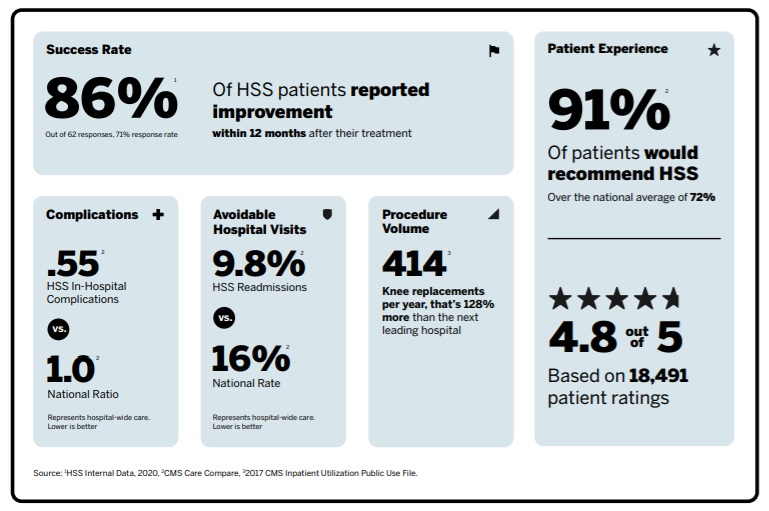Knee Revision
In 85% to 90% of people who have a total knee replacement, the knee implants used will last about 15 to 20 years. This means that some patients who have a knee replacement at a younger age may eventually need a second operation to clean the bone surfaces and refixate the implants. Others may need to have one or more of their implants replaced entirely with new ones. This is called revision total knee replacement or knee revision.
What is a knee revision?
A knee revision is the replacement of prosthetic implants in a person who previously had a total knee replacement. In this surgery, known as a "reoperation," an original prosthesis is removed and a new prosthesis put in place.
Some knee revisions may require the replacement of only one implant, while others require a complete exchange of all the prostheses that were implanted during the original knee replacement surgery (known as "revision total knee replacement"). A complete revision of this type is a complex procedure that requires extensive preoperative planning, specialized implants and tools, prolonged operating times, and mastery of difficult surgical techniques.
Who needs knee revision surgery?
A knee revision may be necessary for anyone whose prosthetic knee implant fails due to injury or wear, or who gets an infection in the area around implant. In elderly people who have a knee replacement, the artificial knee implants may last for life. But in younger patients, especially those who maintain an active lifestyle, knee prostheses may eventually fail, requiring a second replacement later in life.
(Find a surgeon who performs knee revision surgery.)
The most common reasons people for knee revision are:
- Infection: The risk of infection from a total knee replacement is less than 1%, but when infections do occur, a knee revision of one kind or another is necessary.
- Instability: This occurs when the soft tissues around the knee are unable to provide the stability necessary for adequate function while standing or walking.
- Stiffness: In some patients, excessive scar tissue may build up around the knee and prevents the joint from moving fully.
- Wear and tear: This can include loosening or breakage of prosthesis components due to friction over time.
Knee revision video
Video: View a step-by-step animation of a knee revision procedure
Why you should choose HSS for hip or knee revision
Hip or knee revision surgeries have the capacity to improve your mobility, strength and coordination. But not all hospitals achieve the same results. Some are more reliable than others. With the help of the HSS Hospital Reliability Scorecard, you can make sure you're asking the critical questions to find the hospital that's right for you. Understanding these data points will help you make the best decision for your care: See hospital reliability data
Articles related to knee revision surgery
Read frequently asked questions about revision total knee replacement and more below.
Knee Revision Success Stories
Updated: 8/7/2020

